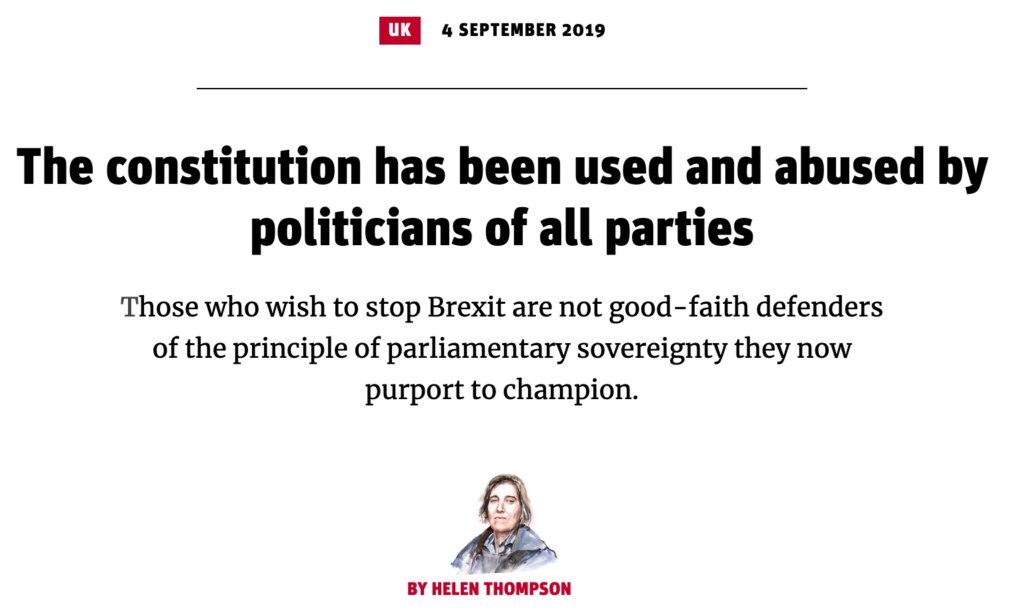You can tell that Term hasn’t started yet!
Crooked Timber
Walking in some woods last Sunday (which was a glorious September day) I came on this tree, which brought to mind Kant’s sombre dictum that “Out of the crooked timber of humanity, no straight thing was ever made.”
Which of course then reminded me of one of my favorite blogs.
Full text of Article 50
Since the UK Supreme Court has started its deliberations on the government’s dubious procedural antics, it might be worth considering what Article 50 of the Lisbon Treaty says. Here it is, in all its succinct glory:
Any Member State may decide to withdraw from the Union in accordance with its own constitutional requirements.
A Member State which decides to withdraw shall notify the European Council of its intention. In the light of the guidelines provided by the European Council, the Union shall negotiate and conclude an agreement with that State, setting out the arrangements for its withdrawal, taking account of the framework for its future relationship with the Union. That agreement shall be negotiated in accordance with Article 218 (3) of the Treaty on the Functioning of the European Union. It shall be concluded on behalf of the Union by the Council, acting by a qualified majority, after obtaining the consent of the European Parliament.
The Treaties shall cease to apply to the State in question from the date of entry into force of the withdrawal agreement or, failing that, two years after the notification referred to in paragraph 2, unless the European Council, in agreement with the Member State concerned, unanimously decides to extend this period.
For the purposes of paragraphs 2 and 3, the member of the European Council or of the Council representing the withdrawing Member State shall not participate in the discussions of the European Council or Council or in decisions concerning it. A qualified majority shall be defined in accordance with Article 238(3)(b) of the Treaty on the Functioning of the European Union.
If a State which has withdrawn from the Union asks to rejoin, its request shall be subject to the procedure referred to in Article 49.
Note the phrases in bold type. (My emphasis.)
Quote of the Day
”For all the progress made, it seems like almost all important questions in AI remain unanswered. Many have not even been properly asked yet.”
Francois Chollet
Quote of the Day
”It’s a paradox wrapped in an oxymoron about a moron: Trump’s faux-thenticity somehow makes the Democratic candidates seem more packaged, more stuck in politician-speak.”
Maureen Dowd, writing in the *New York Times about the Democratic candidates for the presidency.
Creative wealth and moral bankruptcy
Tomorrow’s Observer column, which for some reason is online today:
In the parallel moral universe known as the tech industry, the MIT media lab was Valhalla. “The engineers, designers, scientists and physicians who constitute the two dozen research groups housed there,” burbled the Atlantic in a profile of what it called the Idea Factory, “work in what may be the world’s most interesting, most hyper-interdisciplinary thinktank.” It has apparently been responsible for a host of groundbreaking innovations including “the technology behind the Kindle and Guitar Hero” (I am not making this up) and its researchers “end up pollinating other projects with insights and ideas, within a hive of serendipitous collaboration”.
That was written in 2011. In the last two weeks, we have discovered that some of this groundbreaking work was funded by Jeffrey Epstein, the financial wizard who took his own life rather than face prosecution for sex trafficking and other crimes. It should be pointed out that most of those researchers were entirely unaware of who was funding their work and some of them have been very upset by learning the truth. Their distress is intensified by the discovery that their ignorance was not accidental…
MORE danah boyd’s Acceptance Speech (link in the post below) is worth reading in this context, because she worked for a time at the Media Lab.
Why the tech industry has to change
From danah boyd’s acceptance speech on being given the 2019 Barlow/Pioneer award:
“Move fast and break things” is an abomination if your goal is to create a healthy society. Taking short-cuts may be financially profitable in the short-term, but the cost to society is too great to be justified. In a healthy society, we accommodate differently abled people through accessibility standards, not because it’s financially prudent but because it’s the right thing to do. In a healthy society, we make certain that the vulnerable amongst us are not harassed into silence because that is not the value behind free speech. In a healthy society, we strategically design to increase social cohesion because binaries are machine logic not human logic.
The Great Reckoning is in front of us. How we respond to the calls for justice will shape the future of technology and society. We must hold accountable all who perpetuate, amplify, and enable hate, harm, and cruelty. But accountability without transformation is simply spectacle. We owe it to ourselves and to all of those who have been hurt to focus on the root of the problem. We also owe it to them to actively seek to not build certain technologies because the human cost is too great.
Constitutional hypocrisy
Terrific — and disconcerting — New Statesman column by Helen Thompson. Her argument is that many of the opponents of Brexit in Parliament are doing so in bad faith.
This country’s accumulated constitutional customs ultimately uphold the idea that power rests on the consent of those who are governed. Any sober reflection on the UK’s history will show that overturning a referendum result before it has first been implemented would be a precipitous act. Consequently, members of parliament who ran for parties with a manifesto promise to implement the referendum result and who have since expended considerable effort to prevent Brexit are taking tremendous constitutional risks. Members of parliament who have passed laws purportedly to realise Brexit but in practice to buy time to thwart it are being similarly cavalier, as have those who – by signalling to the EU27 that parliament would obstruct no deal or prevent Brexit all together – have impeded the executive’s ability to negotiate an orderly withdrawal that parliament could accept.
That’s not to say that Boris Johnson is a constitutional saint either. But,
in terms of constitutional prudence, the government’s errors, illusions and inflammatory rhetoric do not compare with treating the referendum result as disposable. The referendum allowed voters to express a view on EU membership uninhibited by party voting habits or what anyone in parliament thought. That is what referendums offer, even if governments who pursue them hope voters will treat them as confidence votes. This one had been a long time coming. There was an issue about the UK’s consent to the EU that politicians had suppressed with referendum promises that were never realised.
It was a momentous decision when the House of Commons finally agreed to take the risk of asking the electorate whether it consented to the part of the constitution defined by EU membership. Parliament cannot, with any semblance of constitutional responsibility, now exercise judgement as if it did not.
The only weakness in this argument would emerge if the Referendum result were to be declared invalid because of distortions caused by the shenanigans of the two Leave campaigns. I’m pretty sure that both camps broke electoral laws, but in itself that doesn’t prove that the vote was invalid.
Tableware
Quote of the Day
”Never attribute to malice that which can adequately be explained by stupidity”.
- anon




